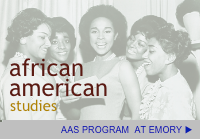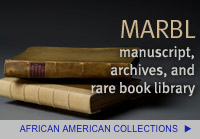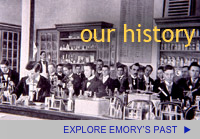Atticus Haygood
Atticus Haygood: A Southern Man with Progressive Beliefs
Throughout the South after the Civil War, race and freedom were two terms that were still undefined in reference to newly freed blacks. Through the late 19th century, blacks occupied an uncertain place within southern society. Whites did not try to accord blacks with the status of free, and this caused great social and political confusion amongst the two groups. Atticus Haygood’s text Our Brother in Black: His Freedom and His Future works to clarify what he believes are misconceptions of southern race relations and explains how the freedom of blacks can be beneficial to all southerners including whites.
Haygood supports his belief in the moral responsibility of whites to their black brethren by using scripture and biblical references. He argues that blacks belong in the South and negates the idea that all freed blacks should be sent back to Africa. He believes in incorporating blacks into society to push the South forward after Reconstruction. His argument opposes the pro-slavery argument that slaves should occupy a subservient position within the community. For example, George Fitzhugh believes that African Americans should remain enslaved because, according to him, slaves would be unable to live within a society where they were free and would have to be responsible for themselves. Atticus Haygood, a former Emory President and Methodist bishop during the late 19th century, initially appears to be a traditional southern racist with his assertions that “the great majority of Africans in the Southern States are pure-blood Africans, though many lighter skins among them show the mixture”(6). He makes a point to stress that “in the South the half-breeds are generally found in towns and cities, and from towns and cities most tourists derive their impressions of a country. But the great mass of the Southern population is rural” (7). As the text continues, he emerges not simply as a racist whose goal is to make southern states appear more humane, but primarily as a conformist who supports and accepts the laws prescribed to him as a citizen.
Atticus Haygood originally championed slavery. He reasoned that slaves were given good lives, living with family and being cared for; instead of being forced to support themselves without the guidance of their white “parents” (masters). For example, during the Civil War he worked as a chaplain for the Confederate army. Haygood believed that it was his moral and civic duty to serve the Confederacy by attending to the spiritual needs of enlisted men and providing them uplift during wartime. As the war came to an end and the Emancipation Proclamation was decreed, Haygood shifted, just as the laws shifted. He pushed for the inclusion of free blacks into southern society. He no longer subscribed to the norm that slavery was acceptable but believed that slaves could be rehabilitated from their uneducated state to a position that would morally and economically benefit the South. In contrast to his initial appearance as a southern racist, the evolution of Haygood’s ideology after the Civil War reflects that he is a progressive man whose initiatives and thoughts were advanced for their time and place.
As a southern slave owner, it is surprising that Haygood was determined to work so adamantly to help former slaves merge into southern society. He worked with missionary groups to educate Africans in the Christian way of life and cofounded an organization that provided funds to the South for the education of freed African Americans. As a boy growing up, contrary to the situation of many southern families, Haygood’s family did not own a plantation. His family initially resided outside Athens but soon moved to Atlanta. His geographic transition helps explain his understanding of slavery as a familial institution. Haygood and his family did not have a large multitude of slaves, and his father was a devout minister in the Methodist church. He did not appear to be exposed to the more brutal elements of slavery. According to Haygood the two slaves within his life were treated as family and received “family” names such as aunt and uncle (37). Instead of associating slavery with pain or harm, Haygood learned of slavery as a normative practice that worked to promote the union of whites and blacks. He was not taught that the practice of slavery was something that caused incomparable harm to hundreds of thousands of people; instead, his sheltered upbringing limited his exposure to the true face that slavery had taken on within the southern states: rape, abuse and racial degradation.
Haygood believed that the South and the North should stop blaming each other for the enslavement of Africans and should instead work to find an amicable solution that would include freed blacks into southern society. He argued that southern whites needed to stop hindering freed blacks from their economic, moral and spiritual progression through what he saw as “unchristian” tactics, such as physical violence and socio-economic exclusion. Instead Haygood believed that white southerners should work to help lift their fallen black brothers by teaching them the ways of Christianity and educating them to become active members of their communities. Haygood believed that African Americans had a place within southern society not as merely laborers but as equals under the authority of God, an argument that further highlights his progressive perspective. Haygoods’ belief that freed Africans should be economically, morally, and spiritually uplifted as equals could be seen as evidence of his moral code, but he fails to propose any practical measures for doing so. His words and expressions may hint at revolutionary goals, but Haygood appears firmly devoted to remaining within the parameters of the legal structure. He works hard to uphold his Christian duty but also works to uphold his civic duty. Haygood is a clear example of an influential individual who was progressive with his thoughts—as well as some of his actions—but he lacks the radicalism to invoke massive change. Being born a white, educated male with Christian values places Haygood socioeconomically above many of his adversaries, and he uses this esteem to champion the cause of African racial integration.
Unlike Haygood, other late 19th century writers such as George Fitzhugh believed that incorporating Africans and their descendants into the southern community as equal citizens was ludicrous. Fitzhugh firmly believed that African Americans belonged in the South, but only as slaves. He argued that slavery was the best way to protect the southern states from becoming like their northern brethren who subjected freed men to wage labor. Wage labor did not secure Africans with the support and security that slavery was thought to provide. Fitzhugh argues that northern African Americans were required to make their own living arrangements, supply their own nourishment, and protect themselves from people seeking to harm or exploit them. These characteristics, he claimed, showed that there was one major difference between the North and the South: the North was more dangerous to Africans than the South. Fitzhugh writes that the South would provide all that was needed for African Americans would also lessen their worry about the toils of life. Without being burdened with freedom, he continues, slaves would be able to live merrily and only have to focus on working instead of being weighed down by the pressing worries of providing for themselves. Fitzhugh goes further with his argument that “the interest of master and slave are bound up together, and each in his appropriate sphere naturally endeavers to promote the happiness of the other.” (302). He elaborates the familial relationship, stating that “besides wife and children, brothers and sisters, dogs, horses, birds and flowers-slaves,also, belong to the family circle.” (301). Fitzhugh’s inclusion of slaves as family members provides one of few similarities between his text and Haygood’s. The notion that slavery within the South was a family matter that allowed the slave some human characteristics, one argument that expresses why slavery was so widely accepted but also, according to some white southerners, why freed slaves should still be helped.
Haygood’s further supports his argument by providing biblical references as to why slavery is unjust for any Christian man to partake in. He states, “I am not called on to discuss the right or wrong of slavery.” (39) Instead he focuses on remembering “that God has set them free as well as the negroes and that now the “truth” should “make them free” altogether and forever.” (41). In the text he endeavors to step away from the notion that freeing slaves is a problem and attempts to show that African Americans, as well as whites, should be thankful that God has allowed for black freedom. Haygood argues that his goal is not to choose a side but instead to focus on the problem of engaging with the freed population so that they can have the opportunity to become fine citizens of the South. Throughout the text, Haygood takes a various sides; he uses his status as a prominent white man within the community, as well as a religious clergyman, as a way to vocalize his support for the South in the war. With the war over and the slaves freed, he moves on to how to best unite the southern white race with freed slaves. He tries lead the reader from his previous argument that slavery should be continued to the argument that freed slaves are best fit to stay in the South instead of going North or even going back to Africa. Haygood uses his white superiority, as well as his notoriety, to drive home his point that freed slaves’ economic, moral, and spiritual advancement rests on the support of white southerners. His argument is strongly supported by fellow abolitionists from the North as well as other religious clergy who have conformed to new legal codes that are in place, but his delivery contains flaws that contradict some of his previous arguments. Haygood fails to acknowledge how his status as a leading Methodist Preacher, former slave owner, and President of Oxford College have worked to provide him with a place of privilege from which to espouse an advantage his condemnation of racial discrimination.
Atticus Haygood works to frame his argument under the pretext that he is like the everyday laborer. He fails to provide the reader with any tangible evidence that supports why slaves should be included in the southern community other than that it is where they had been for a long time and where they should stay. Haygood’s theory that the southern states could become as industrialized as northern states and move away from the plantation economy has no foundation or precedent, especially to his audience of Southern white planters who need slaves as their cheap labor force. He merely uses his esteem as a notable Methodist preacher and his reputation as a progression with the growth and development of Emory College Oxford to persuade the Southern whites that this is the best tactic for tackling the issue of how to engage freed people.
Haygood fails to provide a connection between his lifestyle and the lifestyle of his audience. Although he grew up on a small farm and his family did own slaves, he fails to make that connection to provide his audience with tangible evidence of why his words should be taken with authority. Haygood also fails to dispel the other prominent pro-slavery arguments. George Fitzhugh appeals to his audience by addressing the anti-slavery arguments and disbanding their foundations one by one. For example, Fitzhugh states that while some believed that slaves could be included in the community and taught, African Americans are actually best kept within slavery so they will not have the daily stress of trying to provide for themselves or the worry of engaging with people who are superior in thinking (17). Although the validity of the argument appears faulty, Fitzhugh still gives the reader more information to affirm his authority and keep the reader engaged. Haygood falls short in this department, but makes up for this failure by providing solutions for how to incorporate freed Africans into the community. For example, he argues that slaves can be taught and they can be law-abiding citizens, but they must be given a fair chance. If freed African Americans, he notes, are given religious teachings they can learn how to better serve the community and acquire literary skills that would help them to rise up to the level of their white brethren (61).
Our Brother in Black: His Freedom and His Future provides readers with a host of information regarding the race relations within the North and the South. Haygood attempts to convince southern white readers that they are the source of the racial injustice seen throughout the South and propagated in the North. He informs his readers that they have the power to change the way people view them by working to help freed slaves join the southern community and advance economically, mentally and spiritually. Haygood initially takes the side of southern whites and begins his text by dispelling misconceptions of slavery within the South. He soon takes a more neutral stance as he states the race problem and what can and should be done to alleviate it. His text brings forth ideas that slaves can be educated and uplifted to standards of their white counterparts work and the acceptance of God. Haygood’s text is quite revolutionary because he was a white man telling newly freed Africans that they could be just as elevated financially, morally and spiritually as their ex-slave owners, which was unprecedented for the time. Haygood is a very progressive man with radical views for his time and works to implement these views, both for the advancement of the freed Africans and also to make the South appear more accepting. He does not use his text to make Southern whites feel responsible for slavery, but he does show them that they are responsible to uplift their black brethren so they can achieve equality.
Works Cited
Fitzhugh, George. Cannibals All! Or, Slaves without Masters. Cambridge: Belknap of Harvard UP, 1960. Print.
Haygood, Atticus G. Our Brother in Black His Freedom and His Future. New York: Phillips & Hunt, 1881. Print.




